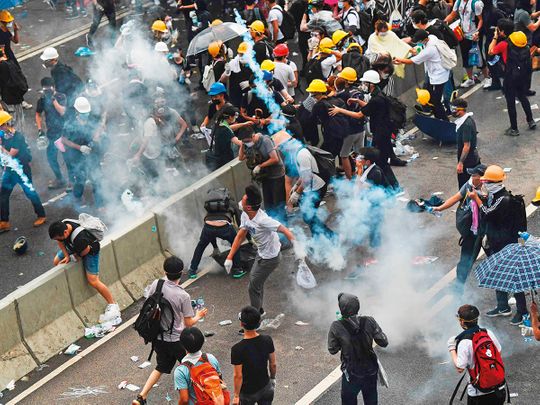
Hong Kong: Riot police turned downtown Hong Kong into a tear-gas covered battlefield on Wednesday as they pushed back against protesters who tried to storm Hong Kong’s Legislative Council. The protesters, angry at an extradition bill that would allow people to be sent to mainland China for trial, hurled bricks, bottles and umbrellas as they clashed with the police, as the demonstrations intensified Wednesday.
Hong Kong’s government indefinitely delayed the second round of debate on an extradition bill that would allow people to be sent to mainland China for trial for the first time, after chaotic protests by tens of thousands of people. Hong Kong residents, as well as foreign and Chinese nationals living or travelling through the global financial hub, would all be at risk if they are wanted on the mainland. Pro-establishment political forces are dominant in the Legislative Council and the bill is expected to be passed by the end of the month.
A line of protesters, many of them young people in black T-shirts, repeatedly rushed toward a ring of heavily armoured police, only to be repelled by the officers who lashed out with blows, rubber bullets, beanbag rounds, pepper spray and tear gas.

There is no doubt this issue is controversial. Explanation and dialogue are useful but perhaps that has not entirely dispelled worries.
During their closest encounters, only a thin metal barrier separated the two groups as the protesters’ front line slowly inched closer to the source of their anger — Hong Kong’s legislature. One police officer held a giant red sign warning protesters: “Stop charging or we will use force.”
What does the extradition bill involve?
The Hong Kong government first launched the proposals in February, putting forward sweeping changes that would simplify case-by-case extraditions of criminal suspects to countries beyond the 20 with which Hong Kong has existing extradition treaties. It explicitly allows extraditions from Hong Kong to greater China — including the mainland, Taiwan and Macau — for the first time, closing what Hong Kong government officials have repeatedly described as a “loophole” that they claim has allowed the city to become a haven for criminals from the mainland. Hong Kong’s leader would start and finally approve an extradition following a request from a foreign jurisdiction but only after court hearings, including any possible appeals. However, the bill removes Legislative Council oversight of extradition arrangements.
Why is the Hong Kong government pushing it now?
Officials said the murder last year of a young Hong Kong woman holidaying in Taiwan partly explains the swift changes. Police say her boyfriend confessed on his return to Hong Kong and he is now in jail on lesser money-laundering charges. A long-forgotten issue, the need for an eventual extradition deal with the mainland was acknowledged by government officials and experts ahead of Hong Kong’s handover from British to Chinese rule in 1997 under the “one country, two systems” model.
The city maintains a separate and independent legal system as part of the broader freedoms the formula guarantees. Little progress has been made in discreet talks since then with justice and security officials on the mainland, where the Communist Party still controls the courts.
How strong is opposition to the bill?
Concern about the amendments has spiralled in recent weeks, taking in pro-business and pro-Beijing elements usually loath to publicly contradict the Hong Kong or Chinese governments. Hong Kong lawyers’ groups have issued detailed submissions to the government, hoping to force a postponement. Authorities have repeatedly stressed that judges will serve as “gatekeepers” or guardians for extradition requests. However, some judges say privately that China’s increasingly close relationship with Hong Kong and the limited scope of extradition hearings will leave them exposed to criticism and political pressure from Beijing.
How have other countries reacted to the proposals?
Foreign political and diplomatic pressure over human rights concerns is rising, too. As well as recent statements from US
Secretary of State Mike Pompeo and his British and German counterparts, some 11 European Union envoys met Hong Kong Chief Executive Carrie Lam to protest formally. “It’s a proposal, or a set of proposals, which strike a terrible blow ... against the rule of law, against Hong Kong’s stability and security, against Hong Kong’s position as a great international trading hub,” Hong Kong’s last British governor, Chris Patten, said on Thursday.
How has Hong Kong government reacted?
Lam and her key officials have been strident in defending the bill both publicly and privately, stressing the need for action in the Taiwan murder and the need to plug a loophole. Lam spoke tearfully Wednesday about the sacrifices she has made for the city. “It’s time to let lawmakers with different opinions express their views under the legislative process,” she said. “On whether to retract or push it through … our consideration is this. There is no doubt this issue is controversial. Explanation and dialogue are useful but perhaps that has not entirely dispelled worries.”
Speaking about her commitment to her job, her voice cracked as she said: “They said I’m selling out Hong Kong. How could I do that? I grew up here with everyone else in the city.” Lam added that she has never “felt guilty” over the issue and insisted she believed she was doing the right thing. She said she felt “worried and sad” about young protesters — many of them teenagers — on the streets, but said that as a parent to two sons, she believed it would be wrong to cave into young people’s “wilful behaviour.”
Will the government drop the bill?
Officials insist broad safeguards mean that anyone at risk of political or religious persecution or who faces torture will not be extradited. Likewise, no one who faces the death penalty will be extradited. China denies accusations of human rights abuses.
While they have raised the threshold to serious crimes only, and excluded nine specific economic offences, there is no hint yet that they will actually scrap the plan. They have also not announced more extensive consultations given the potentially grave repercussions. Chinese officials have also now publicly supported the Hong Kong government in the face of diplomatic pressure, saying it has become a sovereign issue. Some opposition politicians believe the Hong Kong government position is finally wavering, however, and Beijing may allow it to climb down if enough people hit the streets.








